Since its debut with Star Trek: The Original Series in 1966, the Star Trek franchise has given us a multitude of intergalactic adventures to choose from. Spanning more than a dozen shows, 13 feature films, and an entire pop culture empire of comics, novels, and fan projects, over the last 60 years, from its humble beginnings, Star Trek has become one of the most successful science-fiction franchises of all time — and it doesn’t show any signs of slowing down. With Star Trek: Starfleet Academy on the horizon and Star Trek: Strange New Worlds bringing back beloved characters such as Kirk and Spock for a new generation, there’s never been a better time to be a Trekkie.
Videos by ComicBook.com
With so many different series to choose from, each introducing new characters and concepts, Star Trek really does have something for everyone. Every fan will get something different out of the show and, as a fan base, we’re lucky to have so many different series, each of which focuses on a different element of what makes Trek, Trek. But this rich variety has also led to much debate amongst Trekkies as to which shows truly do the franchise justice, and which are better confined to the annals of history. While some pushed the franchise forward with bold new ideas, others admittedly struggled to find their footing.
We’ve looked back at every live-action Star Trek series so far. Here’s how they rank, from worst to best.
8) Star Trek: Enterprise
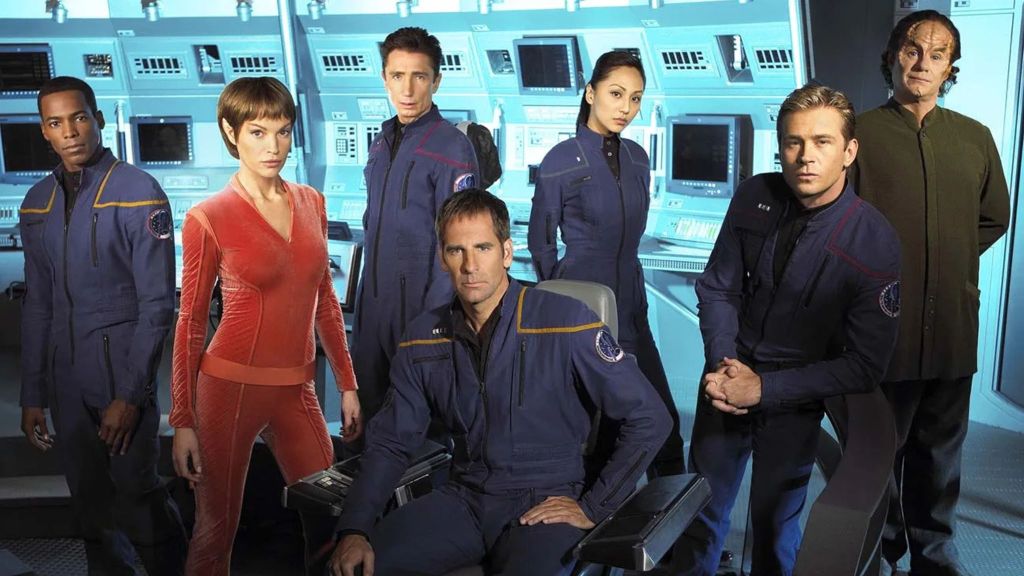
Originally simply titled Enterprise, this fifth spin off from The Original Series had noble intentions — rather than repeating the formula of shows such as Star Trek: The Next Generation or Star Trek: Voyager, giving us yet another crew following in the footsteps of Kirk and other greats, instead it went back in time, showing us humanity’s very first steps into deep space. Set in the 22nd century, before the Federation was even formed, Star Trek: Enterprise is something of a bridge between our current time and the imagined future of humanity that the earlier Star Trek series portrayed. It’s certainly not a bad idea, but its execution left something to be desired.
Scott Bakula never quite hit his stride as Captain Archer, and while Jolene Blalock eventually gave real depth to his Vulcan first Officer T’Pol, she was often oversexualized, with too much emphasis placed on the relationship between her and Trip. Much of the early show leaned on half-baked plots that felt like rehashes of storylines from previous shows. (the infamous pop ballad opening credits didn’t help). By the time the series began to find its footing in Seasons 3 and 4 with more serialized arcs and some fantastic Mirror Universe storylines, the damage was done, and it was cancelled. However, these days the show has gained more appreciation amongst hardcore fans for its delving deeper into the history and foundation of the Federation and Starfleet policy.
7) Star Trek: Picard
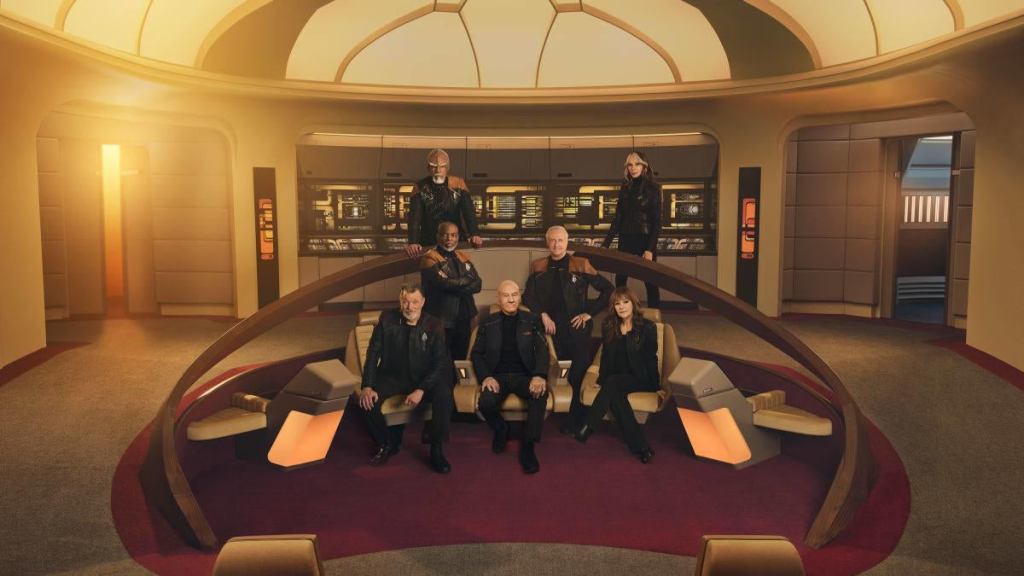
On paper, Star Trek: Picard should have been an instant success. Who wouldn’t want to see Patrick Stewart step back in one of sci-fi’s most iconic roles? Continuing the story of the now Admiral Jean Luc Picard, post his adventures on The Next Generation, the show promised to bring back many familiar faces as well as introduce new ones. It was much anticipated as a blast from the past for The Next Generation fans. Unfortunately, the show often stumbled under the weight of its own ambition. We totally understand Stewart’s apparent reluctance to rely on fan nostalgia and wanting to do something new with the show, but the first season’s android mystery confused more than it inspired, and the second season’s time-travel plot bordered on incoherent at times despite the emotional return of Q (John de Lancie) and Guinan (Whoopi Goldberg).
But then came Season 3. With a full Next Generation reunion, including Trek icons Jonathan Frakes and Michael Dorn, tighter storytelling under showrunner Terry Matalas, and a real sense of finally embracing its legacy, Picard finally became the show fans had hoped for. Season 3 has been argued to be one of the strongest seasons of Trek ever produced, building on the beloved characters and giving them the development and send-off they deserved. It’s just a shame it took two messy seasons to get there and that a grand finale wasn’t enough to get “Star Trek: Legacy” (the name given to a potential spinoff of Picard) off the ground.
6) Star Trek: Discovery

Created by Bryan Fuller and Alex Kurtzman, Star Trek: Discovery started off the modern Trek streaming era with a bang, with bold storytelling full of unexpected twists and cinematic visuals that brought the world of Trek to life for a new generation. Sonequa Martin-Green’s gave a standout performance as Michael Burnham and if there was one thing the show did right it was casting, introducing Anson Mount as Captain Christopher Pike, Ethan Peck as Spock, and Rebecca Romijn as Number One, who helped to deliver a strong second season and making such an impression they even got their own spinoff with Strange New Worlds. The show really came into its stride in Season 3 once Burnham finally earned her place in the Captain’s Chair and Discovery travelled to the 32nd century, allowing the show to imagine and explore humanity’s farthest future yet.
But later seasons of the show often leaned too heavily on galaxy-ending stakes and emotional melodrama, losing sight of the show’s balance between big ideas and character-driven exploration. It’s diverging from established canon, with reimagined Klingons, and the supposed family connection between Burnham and Spock was never a popular move with fans, and Discovery never quite stuck the landing, feeling a little like it had outstayed its welcome by the time it ended. Still, the series will be remembered for its groundbreaking ambition, inclusivity with pioneering LGBTQ+ characters, and plenty of mirror-universe drama. It should certainly be applauded for cementing the franchise in the public consciousness for the modern streaming era.
5) Star Trek: Voyager
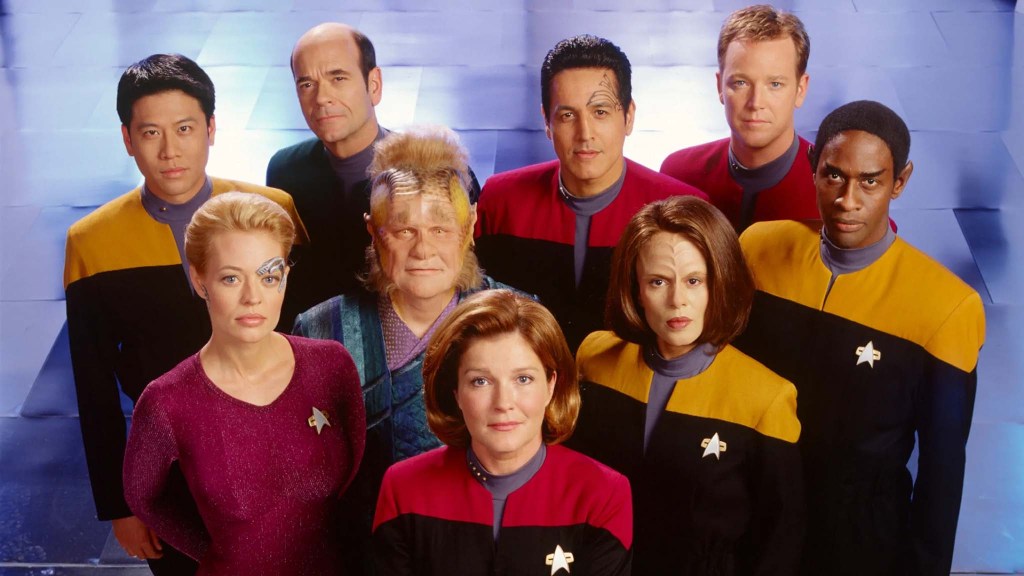
Introducing Star Trek’s first female Captain and stranding the ship in the Delta Quadrant, Star Trek: Voyager had one of the most intriguing premises in Trek history — even if the execution was sometimes hit-or-miss. Though it suffered in its earlier series from having to compete with the admittedly better Star Trek: Deep Space Nine, Kate Mulgrew’s Captain Janeway was a trailblazer. After a slow start, the introduction of Jeri Ryan’s ex-borg character Seven of Nine in Season 4 (who became one of the most interesting characters in Trek history), turned the show into must-watch television.
Still, the series often struggled with inconsistent writing, the stand-alone episode format leading to some underused supporting characters like Harry Kim (come on, give him the promotion already!) and leaving little room to develop the only relationship many viewers were actually invested in, between Janeway and Chakotay. There were some questionable characters who were downright annoying and creepy at times (mentioning no names, Neelix). Its worst crime was perhaps playing things too safe, failing to lean heavily enough into its premise and prioritising the Kazon as the main antagonists rather than the fascinating Vidiians or Borg. Nonetheless, Voyager delivered some unforgettable stories like “Blink of an Eye” and “Counterpoint.”
4) Star Trek: The Original Series
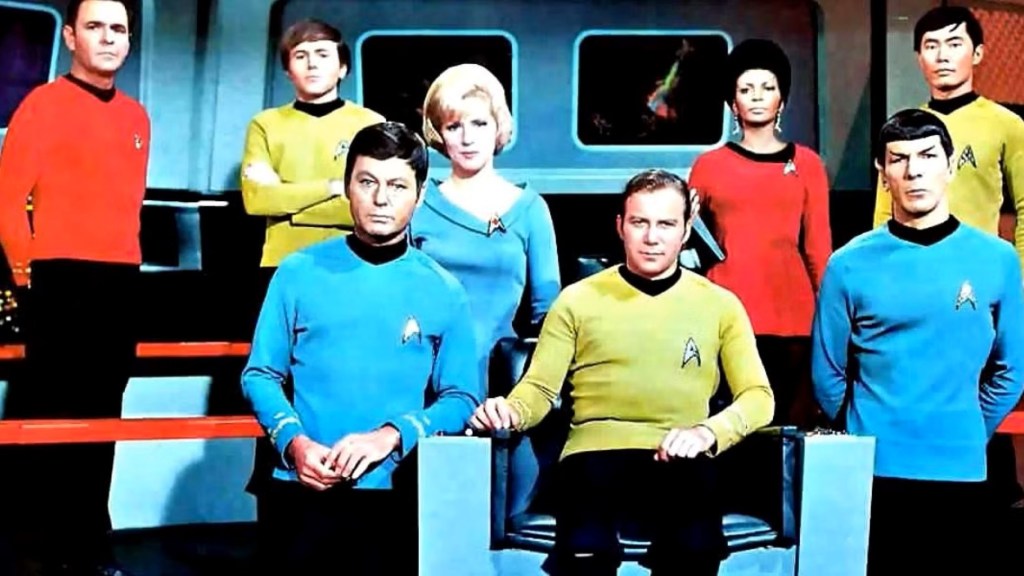
It seems a little unfair to ask The Original Series to compete with its successors; it’s unlikely to win against improved special effects, and given Gene Roddenbury created the show back when black-and-white TV was still a thing, it’s bound to feel a little dated. TOS is the one that started it all. With William Shatner’s Kirk, Leonard Nimoy’s Spock, and DeForest Kelley’s McCoy giving us a trio that has never again been matched on Trek, The Original Series created a blueprint for everything that followed. Its bold storytelling and progressive allegorical social commentary made it revolutionary for its time and classic time travel tales like “The City on the Edge of Forever” still hold up today. There’s a reason Trek in all its forms remains so popular and The Original Series really was the show that launched a thousand spinoffs.
That said, TOS is very much a product of the 1960s, with dated effects, some questionable storylines, and rampant sexism in places. But for many fans, there will always be a certain charm in its kitschy sets and colorful uniforms. It’s undeniably impressive what The Original Series achieved, given its low budget, and no one’s taking away from the sci-fi masterpieces it gave us, but later Trek shows arguably built on and surpassed what TOS pioneered. Still, without this unassuming little series, there’d be no Star Trek at all.
3) Star Trek: Strange New Worlds
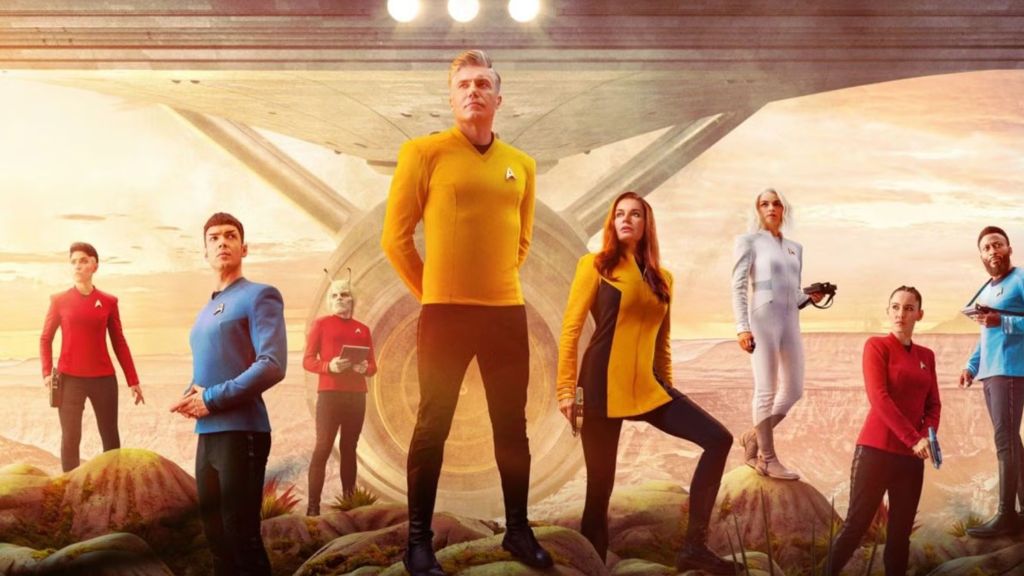
A spinoff of Discovery and essentially a prequel to The Original Series, bringing us Spock and co.’s first adventures aboard the Enterprise, Strange New Worlds, led by showrunners Akiva Goldsman and Henry Alonso Myers, has quickly become a fan favorite by embracing what many modern Trek shows abandoned: episodic adventures. Anson Mount’s charming Captain Pike leads a crew filled with both fresh takes on classic characters (Spock, Uhura) and many excellent new crew members. While it could easily have been dismissed as playing it too safe, returning to familiar territory, the show has proven to be one of the franchise’s best yet, thanks to its fantastic casting and excellent ensemble storytelling.
Strange New Worlds really does feel like what Star Trek: The Original Series could have looked and felt like if it were produced in the present day, shedding new light on Gene Roddenbury’s creation. With a lighter touch, an adventurous spirit that feels like a return to what Star Trek was originally all about, and even a full-blown musical episode, Strange New Worlds isn’t afraid to be what it says on the tin, while still managing to surprise and delight. Anson Mount brings a humor and space-dad energy to Pike that makes the show worth watching for him alone. If it keeps this momentum, it could climb even higher in the rankings in years to come.
2) Star Trek: Deep Space Nine
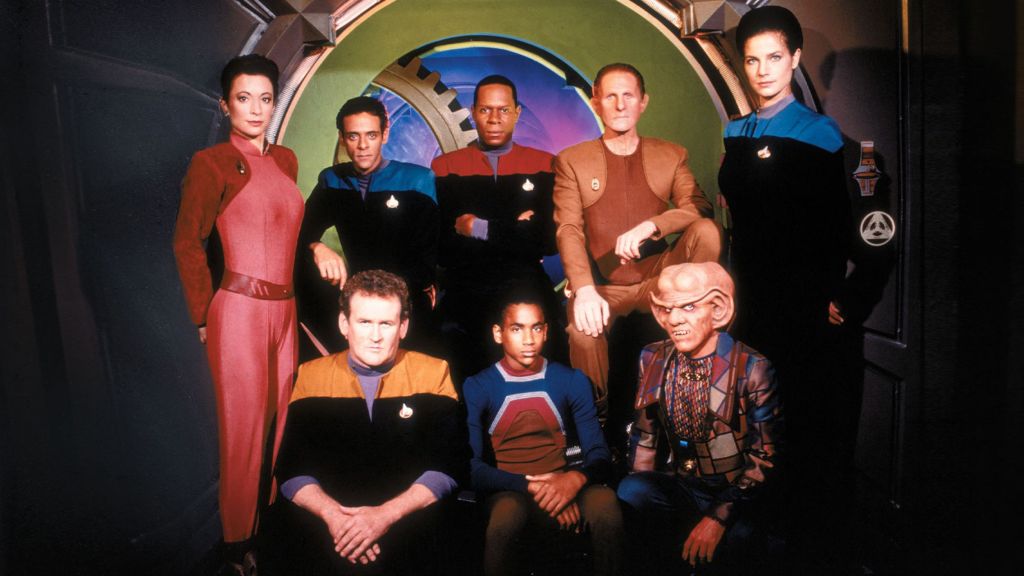
Dismissed by some at first for basing its characters on a space station rather than a ship, which could easily have made the show feel stagnant, Deep Space Nine surprised us all by becoming perhaps the most daring and complex Star Trek iteration. With moves like transitioning to serialized arcs, directly dealing with religion. and placing the DS9 crew at the heart of the epic Dominion War, it broke the mold of episodic storytelling and gave us some of the most innovative storytelling in Trek history.
Avery Brooks’ brilliant Captain Sisko, Nana Visitor’s fierce Kira Nerys, and the endlessly fascinating supporting cast of characters (Quark! Garak! Worf!) gave DS9 unparalleled depth. It was nice to get a slightly darker side to the franchise and explore new elements of Starfleet and the Federation. Episodes like “In the Pale Moonlight” and “Far Beyond the Stars” pushed DS9 into bold new territory, making it one of the franchise’s crowning achievements. However, the show proved it could still be brilliantly funny with episodes like “Take Me Out to the Holosuite” and everyone’s favorite romp “Trials and Tribble-ations” for Trek’s 30th-anniversary special
1) Star Trek: The Next Generation
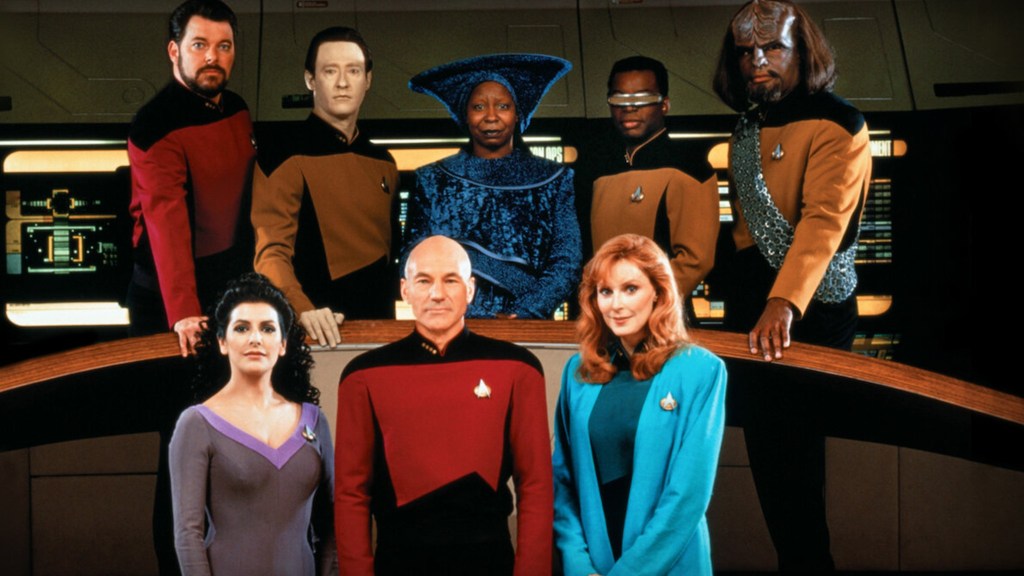
At the very top sits Star Trek: The Next Generation. It’s hard to imagine now, but The Next Generation was once thought an unworthy successor to The Original Series. Don’t forget there hadn’t really been a Trek spinoff yet (if you don’t count the animated series, which utilised the voices and characters of TOS) when it made its debut in 1987. Two rocky early seasons nearly sank it, but by Season 3, TNG had hit its stride. Patrick Stewart’s calm and collected Captain Picard, Jonathan Frakes’s bold Riker (a nod to Kirk’s swashbuckling hero archetype), and Brent Spiner’s iconic Data (who proved himself more than just a Spock replacement) gave the series a dynamic and engaging ensemble who luckily for them could compete with the greats like Bones and Scotty who came before them.
While DS9 might win on boldness, no show embodies the Star Trek ethos more fully than the aptly named Next Generation. Its blend of optimism, philosophy, and adventure set the gold standard for what Trek can be. It borrowed many of the things that made The Original Series great while forging its own path and making better use of its ensemble cast. Episodes like “The Best of Both Worlds” and “The Inner Light” remain among the finest in Trek history. TNG not only revitalized the franchise but also proved Trek could thrive beyond Kirk and Spock, setting the stage for an entirely new era. The TNG crew really felt like a family. Whether debating morality in the ready room, facing down the Borg (who the show introduced for the first time), or sharing a quiet poker game, TNG balanced spectacle with humanity like no other. For millions of fans, it remains the definitive Trek experience — and the bar every new series must measure up to.
All Star Trek shows are streaming now on Paramount+.
Which Trek is your favorite? Do you side with the pioneers of The Original Series, the epic arcs of Deep Space Nine, or the fresh energy of Strange New Worlds? Sound off in the comments!








